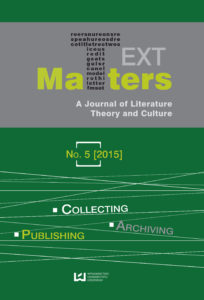The Limits of Language as the Limits of the World: Cormac McCarthy’s and David Markson’s Post-Apocalyptic Novels
DOI:
https://doi.org/10.1515/texmat-2015-0006Abstract
The article examines the correlation between the world and the word in two novels which engage with a post-apocalyptic scenario: David Markson’s Wittgenstein’s Mistress (1988) and Cormac McCarthy’s The Road (2006). Shifting the focus from the very event of catastrophe to the notion of survival through memory and storytelling, both novels problematize the strained relationship between language and reality in an increasingly diminished and dehumanized world. My aim is to investigate the limits of language as well as its capacity to withstand the chaos, loss, trauma, and death that follow the apocalypse. The issues to be considered include the influence of external experience on forms of communication, the role of central metaphors (the archive and the museum in Markson’s novel; cinders and the road in McCarthy’s) and their relation to the form of both novels, as well as the word’s (in)capacity to preserve human values and hopes. Both novels will be discussed as deconstructionist projects in which language becomes a habitat at once impossible and life-preserving: in Wittgenstein’s Mistress it plays the role of both home and prison, whereas in The Road it functions as messianic discourse which simultaneously carries, propels and extinguishes the human hope for a transcendental reality beyond the post-apocalyptic emptiness and doubt.
Downloads
References
Cetinić, Marija. “‘Fragile Pages of Grey Ashes’: Inoperative Archives in Dubravka Ugresić’s The Museum of Unconditional Surrender and David Markson’s Wittgenstein’s Mistress.” European Journal of English Studies 14.1 (2010): 76-87. Print.
Google Scholar
Derrida, Jacques. The Archive Fever: A Freudian Impression. Trans. Eric Prenowitz. Chicago: Chicago UP, 1996. Print.
Google Scholar
Derrida, Jacques. Cinders. Trans. Ned Lukacher. Minneapolis: U of Minnesota P, 2014. Print.
Google Scholar
Derrida, Jacques. “On a Newly Risen Apocalyptic Tone in Philosophy.” Raising the Tone of Philosophy: Late Essays by Immanuel Kant, Transformative Critique by Jacques Derrida. Ed. Peter Fenves. Baltimore: Johns Hopkins UP, 1998. 119-68. Print.
Google Scholar
Derrida, Jacques. The Post Card: From Socrates to Freud and Beyond. Trans. Alan Bass. Chicago: Chicago UP, 1987. Print.
Google Scholar
Derrida, Jacques. Specters of Marx: The State of the Debt, the Work of Mourning, and The New International. Trans. Peggy Kamuf. New York: Routledge, 1994. Print.
Google Scholar
Dewey, Joseph. In a Dark Time: The Apocalyptic Temper in the American Novel of the Nuclear Age. West Lafayette: Purdue UP, 1990. Print.
Google Scholar
Frye, Steven. Understanding Cormac McCarthy. Columbia: U of South Carolina P, 2009. Print.
Google Scholar
Grace, Sherrill E. “Messages: Reading Wittgenstein’s Mistress.” Review of Contemporary Fiction 10.2 (1990): 207-17. Print.
Google Scholar
Kunsa, Ashley. “‘Maps of the World in Its Becoming’: Post-Apocalyptic Naming in Cormac McCarthy’s The Road.” Journals of Modern Literature 33.1 (2009): 57-74. Print.
Google Scholar
Lee, Sue-Im. The Body of Individuals: The Paradox of Community in Contemporary Fiction. Columbus: Ohio State UP, 2009. Print.
Google Scholar
McCarthy, Cormac. The Road. New York: Vintage, 2006. Print.
Google Scholar
Markson, David. Wittgenstein’s Mistress. Champaign: Dalkey Archive P, 1988. Print.
Google Scholar
Rosen, Elizabeth K. Apocalyptic Transformation: Apocalypse and the Postmodern Imagination. Plymouth: Lexington, 2008. Print.
Google Scholar
Snyder, Katherine V. “‘Time to Go’: The Post-Apocalyptic and the Post- Traumatic in Margaret Atwood’s Oryx and Crake.” Studies in the Novel 43.4 (2011): 470-89. Print.
Google Scholar
Wallace, David Foster. “The Empty Plenum: David Markson’s Wittgenstein’s Mistress.” Review of Contemporary Fiction 10.2 (1990): 217-32. Print.
Google Scholar
Wittgenstein, Ludwig. Philosophical Investigations. Trans. G. E. Anscomb. Oxford: Blackwell, 1972. Print.
Google Scholar
Wittgenstein, Ludwig. Tractatus Logico-Philosophicus. Trans. C. K. Ogden. New York: Routledge & Kegan Paul, 1981. Print.
Google Scholar
Downloads
Published
How to Cite
Issue
Section
License

This work is licensed under a Creative Commons Attribution-NonCommercial-NoDerivatives 4.0 International License.













